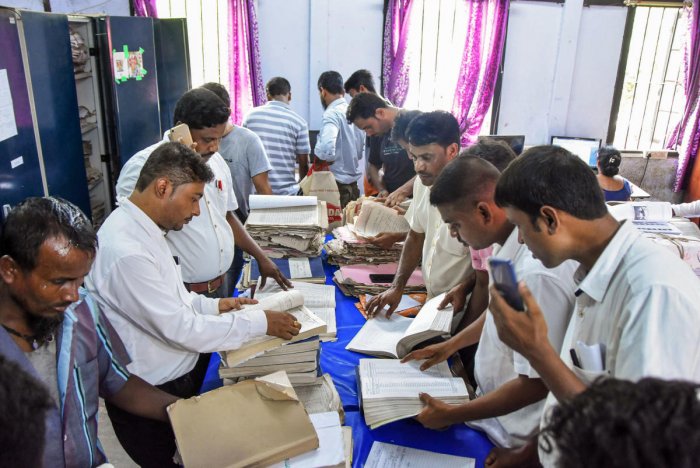The Modi government officially notified the Citizenship (Amendment) Rules, 2024, on Monday evening, signalling a significant development in India’s citizenship framework. Home Minister Amit Shah took to Twitter to announce the news, highlighting the rules’ provisions to grant citizenship to persecuted minorities from Pakistan, Bangladesh, and Afghanistan.
In his post, he wrote, “These rules will now enable minorities persecuted on religious grounds in Pakistan, Bangladesh and Afghanistan to acquire citizenship in our nation… With this notification PM Narendra Modi Ji has delivered on another commitment and realised the promise of the makers of our Constitution to the Hindus, Sikhs, Buddhists, Jains, Parsis and Christians living in those countries.”
The Modi government today notified the Citizenship (Amendment) Rules, 2024.
— Amit Shah (Modi Ka Parivar) (@AmitShah) March 11, 2024
These rules will now enable minorities persecuted on religious grounds in Pakistan, Bangladesh and Afghanistan to acquire citizenship in our nation.
With this notification PM Shri @narendramodi Ji has…
What is the Citizenship (Amendment) Act, 2019?
The Citizenship (Amendment) Act, 2019, is a piece of legislation enacted by the Parliament of India. It amends the Citizenship Act of 1955 to provide a pathway to Indian citizenship for certain religious minorities who migrated to India from Afghanistan, Bangladesh, and Pakistan before December 31, 2014. Specifically, the act grants citizenship to Hindus, Sikhs, Buddhists, Jains, Parsis, and Christians from these countries who faced religious persecution and entered India before the aforementioned cutoff date.
Critics of the Citizenship (Amendment) Act, 2019, argue that it discriminates against Muslims and violates the secular principles enshrined in the Indian Constitution. The act sparked widespread protests across the country, with concerns raised about its potential impact on the secular fabric of India and its implications for the rights of minority communities.
Supporters of the act contend that it is a humanitarian measure aimed at providing refuge to persecuted minorities from neighboring countries. They argue that the act does not affect the existing citizenship rights of any Indian citizen, including Muslims, and is in line with India’s historical tradition of sheltering persecuted communities.
Overall, the Citizenship (Amendment) Act, 2019, remains a subject of significant debate and controversy in India, reflecting broader discussions about citizenship, immigration, and religious identity in the country.
What are the CAA 2024 rules?
The rules, in line with the 2019 amendment to The Citizenship Act, 1955, aim to provide citizenship to migrants belonging to Hindu, Sikh, Buddhist, Jain, Parsi, or Christian communities who entered India before December 31, 2014, from Pakistan, Afghanistan, or Bangladesh.
An online system for application, processing, and grant of citizenship under the Citizenship Amendment Act (CAA) is being explored by the Home Ministry.Eligibility criteria for citizenship application
Eligible applicants include individuals of Indian origin, spouses of Indian citizens, minor children of Indian citizens, individuals with registered Indian citizen parents, and Overseas Citizens of India Cardholders, among others.
Introduction:
The Citizenship (Amendment) Rules, 2024, represent a significant development in the realm of citizenship laws in our country. These rules aim to provide clarity and guidance regarding the process of acquiring citizenship through naturalization, particularly for individuals who are eligible under certain specified categories. Understanding these rules is essential for both citizens and immigrants alike. Here’s a comprehensive breakdown of what you need to know about these regulations:
- Scope and Purpose:
- The rules delineate the procedures and criteria for acquiring citizenship through naturalization.
- They aim to streamline the process, ensuring fairness, transparency, and adherence to legal standards.
- These rules are enacted to address specific categories of individuals who are eligible for citizenship under certain conditions.
- Eligibility Criteria:
- The rules outline eligibility criteria for individuals seeking citizenship through naturalization.
- Specific categories of individuals, such as refugees or those of Indian origin, may be eligible under these rules.
- Factors such as residency duration, lawful status, and fulfillment of conditions laid out in the rules determine eligibility.
- Application Process:
- The rules provide guidance on the application process for citizenship through naturalization.
- Applicants are required to submit the necessary documents and fulfill procedural requirements as specified.
- Authorities responsible for processing applications are mandated to adhere to timelines and ensure efficient handling of cases.
- Documentation and Verification:
- Documentation requirements for citizenship applications are clearly outlined in the rules.
- Applicants must provide proof of identity, residence, and any other documents as deemed necessary.
- Verification procedures are in place to authenticate the information provided by applicants and ascertain eligibility.
- Rights and Obligations:
- The rules delineate the rights and obligations of individuals upon acquiring citizenship through naturalization.
- Citizenship confers certain privileges, such as voting rights and access to social benefits, along with responsibilities such as obeying the law and paying taxes.
- Compliance and Enforcement:
- Authorities are empowered to ensure compliance with the rules and take necessary enforcement actions in case of violations.
- Measures are in place to prevent fraud or misuse of the naturalization process.
- Regular monitoring and review mechanisms are instituted to assess the effectiveness of these rules and make necessary adjustments.
Conclusion: The Citizenship (Amendment) Rules, 2024, represent a crucial framework governing the acquisition of citizenship through naturalization. By understanding the provisions outlined in these rules, individuals can navigate the process more effectively, while authorities can ensure the integrity and fairness of the citizenship system. It is imperative for all stakeholders to familiarize themselves with these regulations to uphold the principles of justice, inclusivity, and respect for the rule of law.
- National Register of Citizens of India (NRC) Document List
- Citizenship Amendment Bill
- Citizenship (Amendment) Act, 2019
- NRC documents required
- National Public Radio (NPR)
Contain Table:
Credit Card:
- Kotak upi rupay credit card apply online
- HDFC Bank UPI RuPay Credit Card
- IDFC FIRST Power Rupay Credit Card
- PCI DSS
Banking:
- Register to IndusNet Online Banking
- BOB Kiosk Banking, BOB CSP, BC Commission chart 2024-25
- Documents Required for Opening a Current Account Online
- csc digipay lite commission 2023-2024
- DigiPay v7.3
- Airtel Payment Bank CSP
- SBI CSP Commission Structure
- SBI CSP – How to register sbi csp
- Fino CSP Lite Login
- Fino Payment Bank CSP Login
- how to apply fino payment bank csp
- Fino Payment Bank Commission 2023-2024
- Instant PIN Generation for Debit Card
- BOB CSP Browser Settings
- 7 Points on UPI Payments
- 5 Best Refer and Earn UPI Apps: Earn Free Cash Online
Other’s:
- Beyond the Beast: Jay Leno Tames the F-150 Raptor R and Unveils Its True Power
- Clash of Titans: Warriors vs. Nuggets – The Ultimate NBA Showdown Unveiled!
- United States one-dollar bill
- South Texas College – Pecan Campus
- How to disable right-clicking on a website using JavaScript?
- Unlocking Craig Brown’s Secrets to Success: The Ultimate Guide
- Unsolved Mystery: The Fate of the Five Men Aboard the Missing Titanic Tourist Submersible
- The NCAA Women’s Basketball Champion
- Dodgers
- Indian Premier League 2024
- Real-Time Billionaires
- Bernard Arnault & family
- Los Angeles Lakers
Following my social platform
| Web | www.mytechtrips.com |
| Join telegram channel | Click here |
| Join WhatsApp group | Click here |
| Click here | |
| Click here | |
| Youtube Channel 1 | Click here |
| Youtube Channel 2 | Click here |




